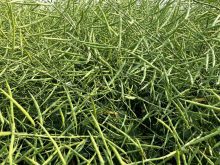After feeling the weight of harvest over the past month and a half, western Canadian chickpea prices are beginning to stabilize as the majority of the crop has been combined across the Prairies.
“It seems harvest is wrapping up, with 80 to 90 per cent (of the crop) done,” said Kevin Silzer, merchant trader and broker with Rayglen Commodities in Saskatoon. “Yields are looking average to better-than-average.”
According to the Saskatchewan agriculture ministry’s crop progress report released Thursday, the average provincial yield is 1,800 pounds per acre, which would be the highest yield in recent years.
Read Also

U.S. grains: Chicago grain prices fall amid profit-taking and dollar rebound
Chicago | Reuters – Chicago corn, soybean and wheat futures fell on Friday, pressured by profit-taking and a rebound in…
Statistics Canada has pegged Canadian chickpea production at 159,000 tonnes for 2013-14 in its Oct. 4 crop production report, up from 137,000 tonnes in the previous report. Even with excellent yields this season, the StatsCan report still had 2012-13 production higher, at 161,400 tonnes.
Despite the increase in production, Silzer said it didn’t cause price movement.
StatsCan’s report “didn’t really affect prices at all,” he said. “Everything seemed to be dropping (in price) the last month, so there were no surprises either way.”
All eyes remain on India and its import situation. It’s well documented that India’s rupee has significantly declined in value, making pulse crop imports more expensive.
Its need for Canadian pulses is also likely lower this season, due to expected record-large pulse production, which is forecast to be over 20 million tonnes.
Silzer agreed the weak rupee and large crops are going to affect the quantity of chickpeas India brings over. India will still import chickpeas, he said, but other markets will have to make up for India’s decline in demand.
“We always got the Middle East and South America for pulse exports,” he said. “Export demand is still steady.”
According to Prairie Ag Hotwire on Thursday, Kabuli eight-mm chickpeas delivered to the elevator range between 21 and 24 cents a pound, while Desi No. 1 chickpeas, delivered to the elevator, are valued at 21.5 to 22.5 cents/lb.
— Brandon Logan writes for Commodity News Service Canada, a Winnipeg company specializing in grain and commodity market reporting.













